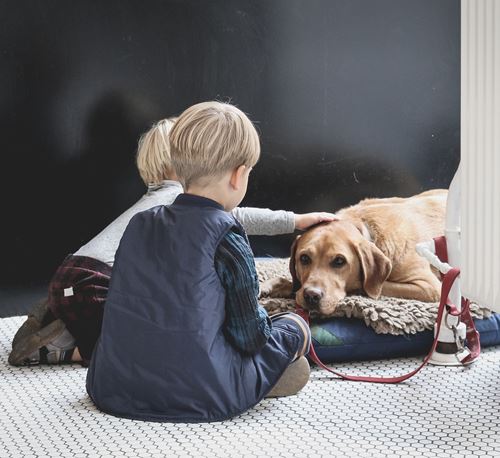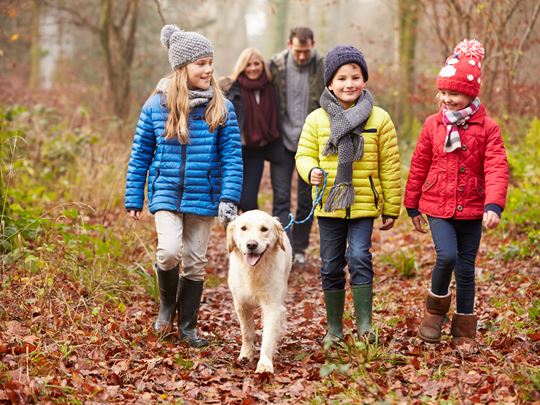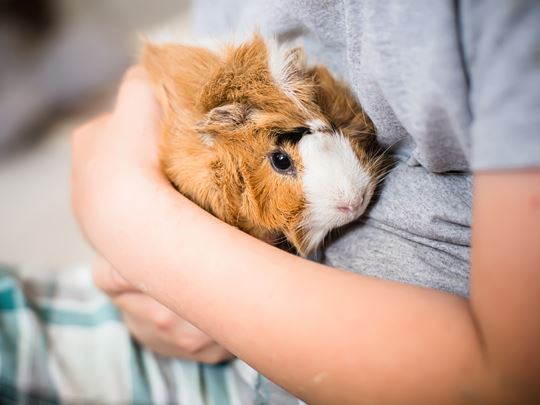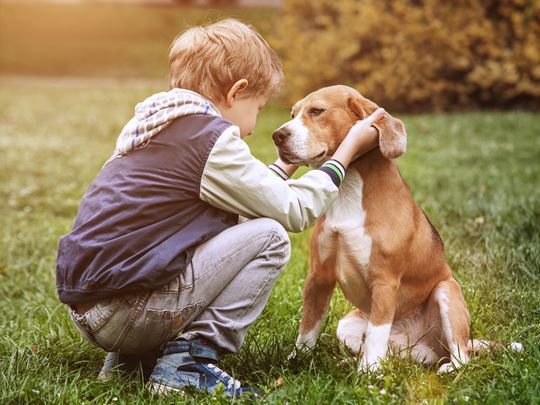13 reasons why dogs are good for children with ADHD & Autism
If your child or foster child has additional needs, a four-legged furry companion could help them emotionally, physically and developmentally.

Dogs and mental wellbeing
They reduce stress & anxiety
The act of stroking a dog has been scientifically proven to lower blood pressure and reduce anxiety. As we stroke, cuddle and play with our pet, the amount of serotonin (the ‘happy’ hormone) we release increases, while the levels of cortisol (the ‘stress’ hormone) lowers. Studies also found that petting a dog for 15 minutes can lower your blood pressure by 10%.
For children with autism, this is a powerful tool to help soothe them during moments of stress or panic, and can be particularly useful if your child is prone to meltdowns and bouts of aggression.
It's also great news for a foster child moving in with a new family. It can be a stressful time moving to a new home, with unknown people. There’s the fear of the unknown, wanting to be accepted and fearful if it doesn’t happen. Then there are other worries, like being unsure of the rules alongside the stress of leaving family members. This all adds to the feelings of anxiety, but with a dog by their side to fuss and stroke, this anxiety could fade away.
Emotional support during meltdowns
Not every autistic child will have meltdowns, but for those that do, dogs can be a great support system. Dogs are able to identify changes in mood and will often gravitate towards a person who may be feeling sad, anxious or stressed. Specially trained dogs for autism will use a range of tactics to help calm a child on the brink of a meltdown. Such tactics include:
- Leaning on the child to apply weighted pressure that is known to be a calming and grounding technique
- Licking the child to help soothe and comfort them
- Using their paws and body to block the child from conducting self-injurious behaviour
For foster children coming into a new environment with new people, having a calming companion by their side could help prevent meltdowns earlier on. This is one of the main reasons why dogs are good for kids with autism.
They provide security, stability and consistency
Children with ADHD (Attention Deficit Hyperactivity Disorder) and ADD (Attention Deficit Disorder) benefit from routine and consistency in their daily life. Knowing what they will be doing and when is an important part of helping them to know 'what is going to happen next'. Our four-legged friends are just the same - they like to be fed at the same time, walked at the same time and understand when their rest periods are too. With a routine in place, your foster children know when to feed the pet and can help prepare the food, take it on supervised walks and even have nap time together too.
They increase independence
Going outside or on public transport can be a stressful situation for both parents and children, but especially those with autism, ADHD, or ADD. If you have a dog for your ADHD child, they are more likely to stay focused and less likely to engage in impulsive behaviours when out and about in public, which not only keeps the child safe, but also puts parents at ease too. Over time, this helps to increase independence and open up more opportunities for your child to confidently engage with the community.
Dogs and Physical Wellbeing
They encourage exercise
Dogs love nothing more than a walk, playing fetch and all things outdoors. Encouraging children to take part and play with a dog will help burn off excess energy for all children, but especially those with ADHD. Exercise is also proven to release those ‘happy’ hormones we spoke about earlier, so if your foster children are exercising and playing with a dog regularly, this could have a positive effect on their overall happiness and demeanor.
They strengthen the immune system
It might sound a little unnerving to know that if you live with a dog, you live with their bugs too! After all, that's why we encourage children to wash their hands after giving a dog fuss. But the reality is, it doesn't matter how clean we are, or how clean we keep our pets; when you live together you share the same microbiome - the millions of bacteria that call our bodies home.
Living with a dog means our immune systems are working to keep us safe from any harmful bacteria they may give to us, especially if your dog likes to lick, whilst also introducing us to other forms of good bacteria.
Pediatric studies have shown that children who grow up with dogs have better immune health than those who don’t. The results of which means those with dogs fall ill less often and when they are poorly can often bounce back to health faster.
They can protect against eczema & asthma
Some studies have shown that dogs actually protect children at risk of eczema. One study showed that children who didn’t live with dogs are 4 times more likely to develop the condition than those that do.
Research has also shown that children who have a birth parent that suffers from allergies or asthma are less predisposed if they have early exposure to dogs. Even if a child's birth parents don't have asthma, there is general consensus that children are less likely to develop the disease with a dog around.
Dogs and child development

They encourage communication
Autistic children have been observed to talk away to pets, even if their communication skills are limited. By doing this, they are helping to increase their own vocabulary without even realising it, and in general, helping them to communicate more effectively. Dogs are good for kids with autism who are non-verbal too, as they can’t speak our language either. They force us to use other ways to communicate aside from spoken language, and watching your non-verbal foster child communicate with a dog could open up your eyes to communication methods you may not have thought about. This will then allow you to create a stronger bond.
Some dogs for autism can even be trained to play special communication games to encourage engagement, which in turn can increase the child’s confidence in communicating with other children and adults.
They can increase appetite for learning
Autistic children can be reluctant to try new things. However, studies have again shown that having a dog at their side can help children to be a little braver and face their fears. It won't always work, as there are many situations that occur when a dog simply wouldn't be allowed to join in - but when they can, it's certainly worth a try.
They teach children empathy
Being caring and kind isn't a skill we are born with – it's something we learn. Depending on a foster child's early life experience, some may not have had the same opportunity to learn empathy naturally, as they may not have had many kind and caring role models to learn from.
Pets can help to give all children real hands-on experience of how to put another’s needs first, which can be especially helpful to foster parents who are teaching kindness, empathy, and caring via example.
Giving children small jobs to help care for a pet can help them to learn responsibility. Feeding, filling up the water bowl, helping to brush their hair, and going for walks with them all help children to understand what it means to care for another. This means children can directly see the impact their actions have on a pet, such as the happy wagging tail of a dog at feeding time. Teaching a child how good it can feel to be kind is a crucial part of their development, and dogs are natural teachers!
Dogs and relationships

They make socialising easier
Dogs are good for children with ADHD and autism as sometimes it’s just their presence that’s needed to make everything okay. Children with autism, ADHD, or ADD can find socialising difficult, especially if they already feel isolated by their condition. But having a dog with them helps to make social situations easier to deal with, especially as dogs are a natural talking point. There’s less pressure to make small talk, as the dog is often the focal point of conversation, or if you have a service dog with a special vest on, others will immediately recognise and understand you have a child who has additional needs. This alone can prevent unwanted questions that would add to a child’s stress levels.
They reduce feelings of loneliness
When a foster child first comes to live with a new family, it can be a little overwhelming or even a bit scary for some children. But it can also be very lonely for a child coming into a brand-new home with brand-new people. The friendship provided by a pet can help children feel less lonely, and in some cases, they often make attachments to the family pet before the humans in the house. Animals also have another advantage for children – they don't make demands and they can't talk back!
This means all they offer is companionship without ever telling a child off or giving instructions, which can provide a great sense of security for your foster children. A dog can help them feel important because they receive unconditional affection, helping to boost their self-esteem which is an important starting block for positive emotional health.
They’re a friend for life
Most importantly, a dog (or cat, or rabbit, or guinea pig!) is a friend for life. The bond between a child and their pet is irreplaceable, and it’s truly magical to witness. Your foster child will never be alone, which is often their biggest fear, so pairing them up with a special buddy to help them thrive and become confident young adults could be the best decision you ever make for them.
If you're thinking about fostering a child and have dogs or other animals in the home, here are some things to consider to be approved.
Already fostering a child? Check out the benefits of working with Fostering People and see how we can support you and your foster family.





